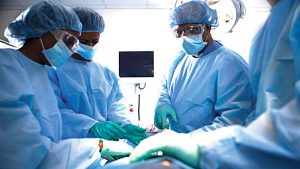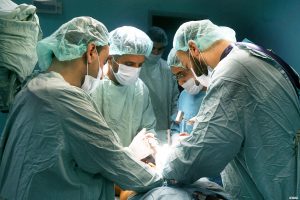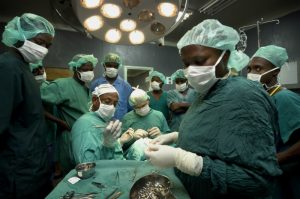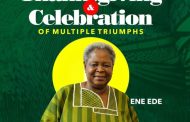By Adagbo ONOJA
There is nothing embarrassing in what took one to the surgery recently. What has become common knowledge is that after the age of 45, a cyst lodging itself in one choice location in the body system or another is nothing surprising anymore. For some people, it comes malignant. For those who enjoy extra benevolence of God, it comes benign as in this case. So, this is not a survival party stuff for which readers have to sympathise with the author. This piece is not for that purpose but one man thinking aloud on what must be the most unbeatable case study of power without domination in the modern world. That is, the power of ‘doctors at work’ or the taken-for-granted power doctors carry in themselves, which allows them to ‘kill’ and then wake up a person as a matter of procedure rather than as an expression of ordination and subordination. It is not the power of the gun but of professionalism.
After all the to-ing and fro-ing associated with making sure that there is nothing malignant about this funny looking, non-threatening intruder in one of the privileged locations of the human anatomy, the D-Day was fixed for the surgical battle with it. One had asked if it was something to launch an appeal fund for a trip to Western Europe or Asia or the Middle East. The reply was that it would be laughable to say one went on medical tourism for that sort of surgery. “I will remove it and you will go home the same day” was the doctor’s reply.
The first date failed because certain things had not been done. But not the second date. The money was available and all the pre-surgery tests had been done and the patient was adjudged good fit to go through it. So, he drove himself to the hospital that morning. After one more shouting match between a set of staff and him, it was time. Temperature and pulse were excellent but not the blood pressure. Why? Could it be that there was experience of fear in spite of the bravado? It cannot be, not with the Doctor who was going to lead the exercise and with whom one had become a conversation mate. Anyway, the experienced nurse said one should wait. When she repeated it after sometime, the machine was now reading something like 119/75. Good to go!

Some Nigerian doctors ” work. Pic credit: The Guardian
From this moment, one was rapidly losing all freedom and authority over oneself. The first of these must be having to change from Kaftan to one funny drape that amounted to bare clothing by normal standard. There is also a change of footwear too in the course of the third movement. The first movement was the one from the lobby to what one came to know later as the Recovery Room. It was from there one was showed into the theatre and its array of medical and paramedical hands, each of them arranged to play his or her own part in the business of temporarily ‘killing’ someone so that he or she could be made complete again, surgically speaking. Here, neither gender nor biology matters. When one asked why they would put a woman to a surgery involving the male core, it was the woman doctor herself who said that as far as the task at hand was concerned, she isn’t a woman but a doctor. End of story!
Welcoming, jovial and re-assuring at every stage but with clinical detachment, they went about the process. They repeated the basic data capture all over again – temperature, blood pressure, etc. So, what is worrying you that your temperature is so high, one of them with the task of numbing my waist down commented rhetorically. It was a mischievous question because he had already primed an injection at a point in the body that one could never have imagined could serve such a purpose. Anyway, he went about it while putting one at ease by speaking to shared cultural features, coming as he is from a state contiguous to the patient’s. A few minutes after, he asked the patient to move his legs, knowing very well that they were no legs anymore. They had been numbed.
The worst stage of the pleasant humiliation was throwing a piece of clothe or something that looked so which purpose was to block one’s view of what the doctors were set to do. Thereafter and for well over an hour, a great deal of violence was going on at a particular part of one’s body but which one was not looking at, hardly felt it and had no input as to the wisdom or otherwise of the actions being taken. One only hoped the doctors were good at what they were doing and, with God, one would come out of it unimpaired. They were snapping just as they were calling one person or the other who appear to be new entrants into the profession to come and learn or confirm something or another. It is unimaginable the amount of power doctors alone hold and deploy: the power to do violence or ‘kill’ in other to save life. After what went on like eternity, the lead doctor announced that the operation had been successful and it was all over. A few minutes after that, members of his team began to dismantle the assemblage of gadgets as quickly as they assembled them, followed by the lead doctor’s explanations on the game he and his team had been playing, the mischief maker they had arrested for wandering about in my body and how quickly my numbed legs will regain its vigour and I could go home. Just like that!

A Google graphic of doctors performing what the original caption calls a cardiac catheterisation operation on children in Gaza, Palestine

Similarly, this graphic is that of medical students watching doctors performing an operation in Moshi in Tanzania
It is one thing to read about what doctors do, the feats they accomplish as reported by medical journals and in the popular press but it is another thing to be the guinea pig at the receiving end of surgical knives. Even 10 minutes in that room could be more than 10- hours for someone free outside. Imagine the likeness of the virtual scaffolding and the fact that one cannot get angry, climb down and walk away from the ‘joke’. So, when next you see a doctor walking down the road, better reckon with the power locked up in him or her. It is a special type of power. Nobody voted for him/her/them, they cannot be impeached and no vote of confidence matters. It is a different kind of power.
Doesn’t it make for thinking about what the world might be like without doctors as we know them today? This is more so in Africa, with particular reference to how well the model of medical practice Chinua Achebe was posing in Things Fall Apart would have coped by now if there had been no (Western) medical practices and the technology upon which the practices have been based. This is an interesting question given how many have been compelled to return to traditional medical practices today, either because they can’t afford the Western or because the Western hasn’t got any answers to so many ailments. But even if the traditional medical practices had developed fully, do there exist any reasons for Nigeria, for instance, to have anything less than world-class medical cum health sector today in Nigeria, given the power doctors exercise?
Doctors, like lawyers and most of the older professions, do not crave publicity or advertisement in relation to professionalism. It is for that reason that names are being mentioned. Otherwise, Dr Nabasu and his team members as well as Nisa Premier Hospital were good. This is a commonsensical view but experientially informed and can, therefore, not be dismissed. May all medical schools in Nigeria be such that doctors coming out of them are doctors we can trust to exercise the enormous powers located in the average medical doctor. Amen!




























